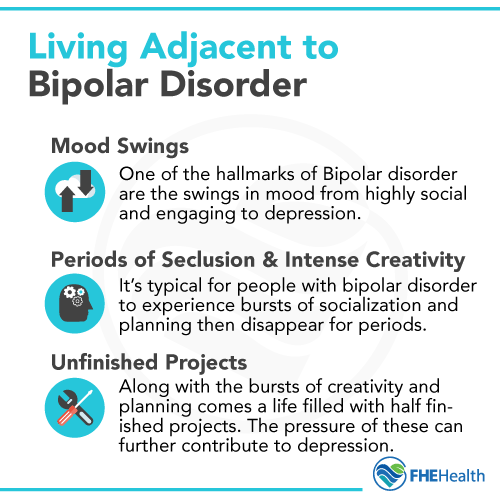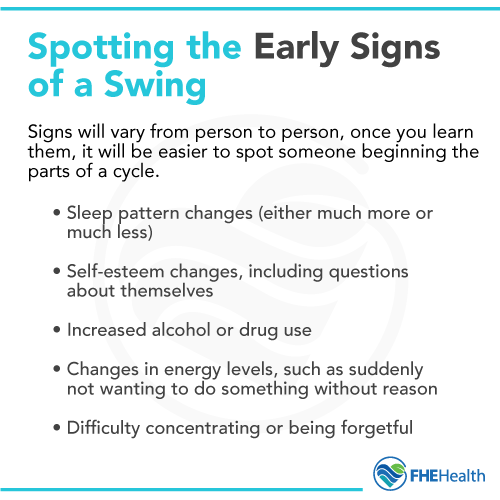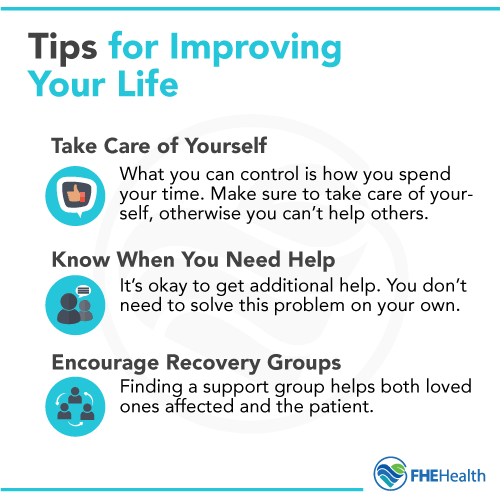
All mental health conditions can be difficult to manage, but for a caregiver, living with a loved one who has bipolar disorder can be overwhelming and terrifying. The condition, which often manifests as shifts from dramatic highs to very lows in activity, energy and mood, is hard to handle, especially on a daily basis. But you can do it.
The National Institute on Mental Health reports that as much as 2.8% of the U.S adult population has bipolar disorder. Supporting a loved one with bipolar isn’t ever easy, but a dedicated caregiver can learn to manage the ups and downs and make life the best it can be.
What It’s Like Being Close to Someone With Bipolar Disorder
 When viewing bipolar disorder from the outside, you might find it hard to imagine what it’s like. Whether you’re living with a person that has bipolar disorder or have a friend or family member with it, it’s important to recognize how their illness affects their day-to-day life.
When viewing bipolar disorder from the outside, you might find it hard to imagine what it’s like. Whether you’re living with a person that has bipolar disorder or have a friend or family member with it, it’s important to recognize how their illness affects their day-to-day life.
If you’re close to someone with this condition, chances are good you want to help. Yet, you may also recognize just how out of control it can be. What can you do? The best possible advice is to take each situation and, in some cases, each moment, one step at a time. Consider a few of the concerns and struggles many people have when living with someone with bipolar disorder.
Managing Medication Adjustments
Many people with bipolar disorder go through medication changes. As their body becomes accustomed to the medication, it stops working as well as it should. If you’re living with someone who is going through a medication change, recognize that this process can be very trying. It’s okay to admit that you can’t control the condition, the moods or the activities of your loved one. During these changes, simply try to be there for them and ensure they get help if they need it.
Aversion to Medication
Your loved one may decide they no longer want to take medication. In some cases, a person with bipolar disorder may maintain the routine use of medication just fine for a long time, then suddenly want to stop. You may even find that they decide to stop without consulting you or their health care provider.
Medications for bipolar disorder are very difficult to manage because they have short- and long-term side effects. In these situations, all you can do is support your loved one.
Encourage them to take their medications. Work with their doctor to get them back on their proper medication doses.
Talk to them about why, when and how they made this decision. Do your best to manage the moment; what do they need you to do right now to keep them safe?
Spotting the Signs of a Swing
 One way coping with mania and depression can be a bit easier is to learn to spot the swing before it happens. That is, learn to recognize the signs that something has changed, and your loved one is about to move through the bipolar disorder spectrum.
One way coping with mania and depression can be a bit easier is to learn to spot the swing before it happens. That is, learn to recognize the signs that something has changed, and your loved one is about to move through the bipolar disorder spectrum.
In some cases, what you notice could be due to not taking medications. Because this is such a significant and ongoing problem for people with bipolar disorder, it is often the underlying cause of their mood or energy level changes. That doesn’t mean you shouldn’t react, but it may mean that you should take steps to ensure they’re using their medications properly.
What Are the Signs of a Swing?
Signs can be different from one person to another, but they tend to be the same every time for each individual. You’ll learn to see changes sooner, giving you more time to react. Look for patterns; they can be the most telling signs of a swing. Some of the most common warning signs include:
- Sleep pattern changes (either much more or much less)
- Self-esteem changes, including questions about themselves
- Increased alcohol or drug use
- Changes in energy levels, such as suddenly not wanting to do something without reason
- Difficulty concentrating or being forgetful
One way to better monitor such changes is to journal. While the person with bipolar disorder should keep a journal to spot their own changes, you, as a caregiver, can do the same to learn more about the patterns.
What to Do When You See a Swing Coming?
Don’t run or duck. Instead, speak to your loved one about what’s happening. Depending on their state of mind and overall well-being, you may want to reach out to a doctor for help as well. In most situations, you’ll want to react calmly. Don’t blame, criticize or attack. Instead, approach the topic openly.
In some cases, you can learn how to help someone with bipolar disorder by speaking to their doctor and counselors with them present. During these appointments, talk about what your responsibilities and reactions should be.
And, in the process, agree to a plan. What does everyone agree you should do if your loved one seems to be about to swing from mania to depression or the other way around? Creating a plan allows you, as the caregiver, to know what your goals and needs are.
Supporting a Loved One With Bipolar Disorder Can Get Better
 Taking care of someone with bipolar disorder can be heartbreaking and difficult, even on the best days. If you’re in a tough spot right now and feel unable to fix anything or are unwilling to keep living life like this, you do have opportunities. Consider these tips.
Taking care of someone with bipolar disorder can be heartbreaking and difficult, even on the best days. If you’re in a tough spot right now and feel unable to fix anything or are unwilling to keep living life like this, you do have opportunities. Consider these tips.
- Take care of yourself. That may mean taking a break or leaving for a day or so to get better control over yourself and your needs. Find someone else to help out.
- Know when it’s time to get additional help. You can’t fix this on your own. Sometimes, your loved one needs inpatient treatment if they are at risk of harming themselves or unstable in other ways.
- Encourage your loved one to participate in recovery groups. While this may not seem like it can help you, it gives your loved one the ability to cope with their life better and, in some cases, that can provide the break and support you need.
Quite often, you may feel as though it’s up to you to save your loved one. It’s not. It’s their disease and their path. All you can do is manage what’s happening right now and encourage them to take the best steps forward.






